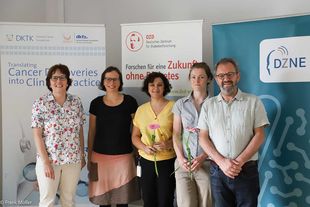At the annual joint symposium, the three Dresden DZGs – the Paul Langerhans Institute Dresden (PLID) of the German Center for Diabetes Research (DZD), the German Center for Neurodegenerative Diseases (DZNE), and the aforementioned DKTK – once again announced seed funding for cross-DZG projects this year. The aim of this funding is to enable new translational activities between the DZGs in Dresden that arise at the thematic interfaces of the centers.
This year, one project team received €10,000 in seed funding. In the project "Metabolic-epigenetic crosstalk as a driver of aging, disease and cognitive decline", Sara Zocher (DZNE) and Zeina Nicola (DZD/PLID) want to gain new insights into the causes of brain ageing. In collaboration with Claudia Peitzsch, they are using the Mass Cytometry Facility of CRTD and use metabolic targeting to investigate the neuronal epigenome as a potential therapeutic intervention. The long-term aim is to counteract age-related brain dysfunction in this way.
Diabetes, cancer and dementia: as different as these diseases may appear, there are often crosslinks that are relevant for the development of therapeutic approaches and investigative methods. The active networking of different DZGs thus reflects a unique opportunity to develop completely new and innovative research approaches. Dresden is a pioneer in this respect, as the three Dresden-based DZGs have been closely connected for several years.

